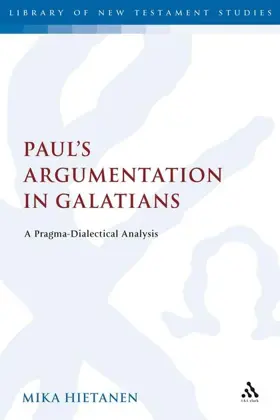

Paul's Argumentation in Galatians: A Pragma-Dialectical Analysis
in Library of New Testament Studies
Pages
232
Publisher
T&T Clark
Published
9/26/2007
ISBN-13
9780567031273
Galatians is a polemical letter which contains a substantial amount of argumentative passages. Paul evidently wanted to persuade by using the best arguments possible to convince his addressees. Using a state-of-the-art method from the discipline of argumentation analysis, Paul's argumentation can be analysed with a precision that standard exegetical methods cannot provide. The pragma-dialectical method developed in Amsterdam facilitates an analysis which is both descriptive and normative. On the one hand, Paul's argumentation can be described, such as the relationship between premisses and conclusions, the structure of the arguments, and features relating to rhetorical strategy. On the other hand, the method makes it possible to evaluate Paul's argumentation against a set of rules for sound reasoning. Fallacies and problematic arguments can be described accurately. The spiritual nature of Paul's matters do not relieve him of rationality, and Paul himself does not argue as if it did.
Paul's argumentation is found problematic in several respects. There is a tension in the text: Paul works a great deal to argue his claims while at the same time giving the impression that he merely wants to declare his standpoints and does not want to carry out an argumentation at all. Many of the conclusions are presented as self-evident, even when they are not. Paul's style is far from an ideal model of the resolution of a dispute. Paul relies heavily on an argumentative strategy with maximal use of rhetorical devices. The analysis shows that a contemporary method of argumentation analysis provides tools necessary to adequately describe and understand both individual arguments and the overarching strategy of the argumentation in a Pauline text.
Paul's argumentation is found problematic in several respects. There is a tension in the text: Paul works a great deal to argue his claims while at the same time giving the impression that he merely wants to declare his standpoints and does not want to carry out an argumentation at all. Many of the conclusions are presented as self-evident, even when they are not. Paul's style is far from an ideal model of the resolution of a dispute. Paul relies heavily on an argumentative strategy with maximal use of rhetorical devices. The analysis shows that a contemporary method of argumentation analysis provides tools necessary to adequately describe and understand both individual arguments and the overarching strategy of the argumentation in a Pauline text.
- Table of Contents
- Preface
- List of Figures
- List of Tables
- Part 1- Introduction
- 1.1 General Presentation of the Task
- 1.2 Overview of Paul's Argumentation
- 1.3 Problems in the Argumentation in Galatians 3.1-5.12
- 1.4 Specific Presentation of the Task
- Part 2- The method
- 2.1 Background
- 2.2 General Characteristics of the Method
- 2.3 Metatheoretical Premisses
- 2.4 Speech Act Theory
- 2.5 A Model for Critical Discussion
- 2.6 Reconstructing Argumentative Discourse
- Part 3- Analysis
- 3.1 The Analytical Procedure
- 3.2 Higher-Order Conditions
- 3.3 The Stages of the Argumentation
- 3.4 Gal. 3.1-5, the Galatians' Reception of the Spirit
- 3.5 Gal. 3.6-14, Abraham's Faith
- 3.6 Gal. 3.15-18, Testamental Practice and Inheritance
- 3.7 Gal. 3.19-25, the Purpose and Function of the Law
- 3.8 Gal. 3.26-29, Equality 'in Christ'
- 3.9 Gal. 4.1-7, the Freedom of God's Children
- 3.10 Gal. 4.8-11, Paul's Concern for the Galatians
- 3.11 Gal. 4.12-20, Paul's Relationship with the Galatians
- 3.12 Gal. 4.21-31, an Allegory of Hagar and Sarah
- 3.13 Gal. 5.1-12, Freedom versus Circumcision
- Part 4- Overview and conclusion
- 4.1 An Analytic Overview
- 4.2 Violation of Rules and Quality of Argumentation
- 4.3 Conclusion: Paul's Argumentation in Galatians